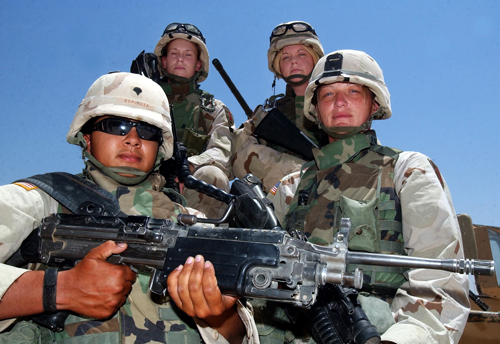They were the first female fighting force to serve in direct combat for the U.S. military: Team Lioness, a support unit stationed in Iraq. Their contributions to the war effort have been all but anonymous. Until now.
G.I. Janes

They were the first female fighting force to serve in direct combat for the U.S. military: Team Lioness, a support unit stationed in Iraq. Their contributions to the war effort have been all but anonymous. Until now.
The Women Veterans Outreach Action Team of Portland State’s Women’s Resource Center is bringing Team Lioness’ story to the university with a Thursday screening of the documentary Lioness (2008) by Meg McLagan and Daria Sommers. The student group will host the film and the group discussion that follows.
The film tracks the lives of several women from Team Lioness after their deployments to Iraq have ended. The women reunite with their families, read journal entries from their days on the front lines and reflect on the challenges of rejoining civilian life.
As a support unit, Team Lioness was initially charged with backing up the frontal units on the field. The women soldiers helped smooth relations with the local populace, dealing with women and children in duress as frontline troops handled combat.
But as the situation began to deteriorate in the Iraqi city of Ramadi, Team Lioness found itself dug in with the rest of the troops in a series of engagements that would change their mission—and their lives.
The documentary also features interviews with officers of various ranks, who help paint the tactical and political picture framing the squad’s mission. Field commanders describe the lack of training provided to women sent to the battlefield, and higher-ranking officials discuss the foggy legality of the women’s posting to high-risk positions.
But, at its heart, Lioness is more personal than political. Much of the film follows Shannon, a young veteran recently returned to her civilian life in rural Arkansas. She explains, in stark terms, the emotional cost of facing the horrors of war while relating the stories of her combat experiences. Her family members show concern for her wellbeing and help sketch out a road to recovery.
The story of Team Lioness went largely untold during the war and immediately afterward. At one point in the film, the reunited women watch a television documentary detailing battles in which they were specifically engaged. They go completely unmentioned.
“Watching the film and realizing that these women were completely wiped out of history and weren’t represented in any way—that’s really the part I connected with because we’ve been in that situation, too,” said Britni Childs, women veteran outreach coordinator for the WRC.
Childs, herself an Air Force veteran, related some of the other challenges faced by veterans, particularly those returning to school.
“Reintegration is really hard, especially trying to reintegrate in a college, where everyone is younger than you, in a town where there are no active-duty military members,” she said. “So one of our biggest goals is to build community, and the only way to do that is to put yourself out there, which is kind of what we do.”
In addition to the screening, the Women Veteran Outreach Action Team hosts other regular events, including a monthly game night and educational events.
The screening is co-sponsored by the Viking Vets, PSU’s student organization supporting veterans attending the university. The Vets offer a broad range of social events throughout the year, from outdoor activities to military balls. The group makes available to veterans two internally funded scholarships each year.
“We offer events where we do team-building and camaraderie and offer support for veterans in any capacity that we can,” said Angie Hartlove, vice president of finance for the Viking Vets and chair of the Action Team. “Anybody who has served or is interested with allying with either of the veterans’ groups is welcome to be a member.”
The outreach team views the screening of Lioness as a chance for the veteran women on campus to watch five soldiers’ stories—and perhaps to share some of their own. They noted that the film features moments of extreme violence, of which attendees should be aware.
“We’re certainly hoping to open it up to other women veterans that have had combat experience. I know we have several women veterans that have come to meetings who have been in combat and are really working on adjusting to civilian life and college life,” Hartlove said. “We mean it as an opportunity to have a place to discuss and heal and to figure out what it’s like for women that are serving now or in the recent past.”
Lioness (2008)—film and discussion
Thursday, May 17
3:30–6:30 p.m.
Women’s Resource Center
1802 SW 10th Ave.
Free and open to the public





